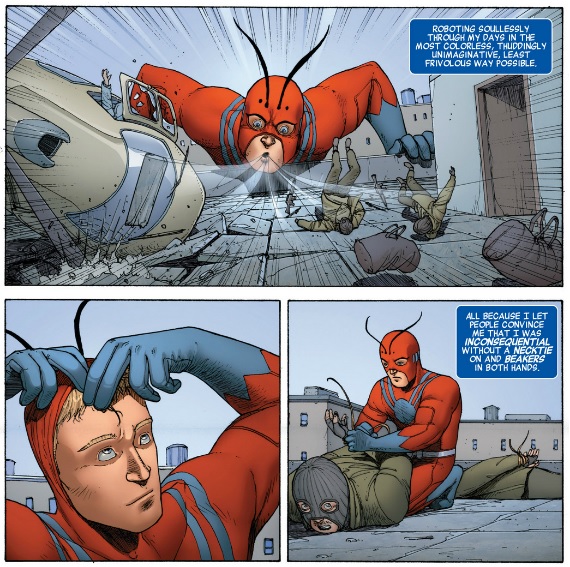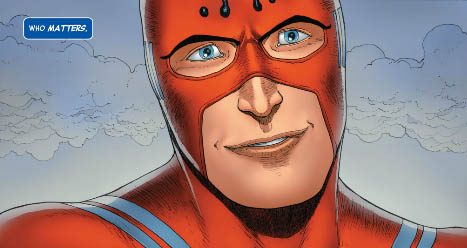Today, Shelby and Taylor are discussing Age of Ultron 10 A.I., originally released June 26th, 2013. This issue is part of the Age of Ultron crossover event. Click here for complete AU coverage.
Shelby: After the reality-shattering events of issue 10, we were left asking some big questions, namely, “What the hell was that?” For a second, the reality of the Marvel universe started to come unglued. Or maybe did actually come unglued, at least partially. Instead of focusing on the effects on the timeline itself, this issue focuses instead on the effects on one man, the man who started it all: Dr. Hank Pym.
Hank has been having a rough day. Having to destroy his greatest creation and the realization that his greatest creation was a murderous genocide machine has made him feel…is there anything lower than “depressed beyond all reason?” As terrible as that is, the real thing that has him down is that glimpse into the alternate future, the one created after Wolverine killed him in the past. Pym was dead, Ultron was never created, and still everything was terrible. The realization that his existance means so little leads Pym to recount his life as a brilliant child who would rather invent things out of his imagination than for practical purposes. The death of his grandma, his imagination inspration, led him to only invent practical, boring things, which ultimately led him to a practical, boring life. Tiring of his boring work, he snapped, discovered Pym particles, and began his less-than-practical life as a costumed superhero. At this point, Pym realized that the world went to hell after his “death” because his life was meaningless, it was because his life was so meaningful. With that, he snaps out of his funk, dons his costume, and goes back to being exciting Hank Pym.
Also, there’s an epilogue that shows Pym tinkering with, or possibly inventing, a Doom-Bot.
I can somewhat identify with Pym. I work a 9-5 desk job that, in the grand scheme of things, isn’t that bad. The company is pretty casual, my coworkers like and respect me, and I don’t hate the work. But sometimes, I’ll look at the lives my artist friends lead, and I’ll regret choosing the practical, more boring path. I don’t throw it away because my existential crisis over abandoning the creative, imaginative life hasn’t yet out-weighed my appreciation of health insurance and buying video games whenever I want; I suppose that makes me a sell-out. The reality though (and one of the weaknesses of this issue) is that practicality and imagination are not nearly as opposing as Mark Waid would have us believe. A solution can be both practical and imaginative. A carburetor is practical, a device that scrapes the icing off Oreos because the dragons are allergic is imaginative. But a carburetor that works in a way no one had ever thought before, and mixes fuel and air more efficiently than ever is both. Both aspects of science can and should exist together, and the fact that Pym, this imaginative super-genius, believes it can only be one or the other makes his story feel a little hollow.
My biggest complaint about this issue is that, for a story about the importance of imagination and leading a creative life, I thought it was kind of boring. Child Hank Pym was cute, with his wacky genius ideas, and adult Hank Pym’s decision to throw away real-life for costumed superheroics (twice!) is inspiring in it’s own way, but I felt really detached from the story. It’s the classic problem of too much expository narration. With Pym narrating the whole story, I was merely observing it happen instead of being immersed in what the characters were experiencing; I never felt drawn in, and was rather bored and unimpressed by the whole thing.
The big driver of this issue is the Doom-Bot reveal in the one page epilogue.
This is supposed to be super shocking and crazy, right? It just falls flat for me. I feel a little let down that, despite everything that happened, Pym would go right back to messing around with robots and A.I. It invalidates anything he might have learned from the experience. Other than that, the larger meaning of this is lost on me; maybe one of you long-time Marvel readers can help me out on this one. Is this just an alternate reality resulting from last issue wherein it’s Pym, not Doom, who invents the Doom-Bots? Instead of creating one killer robot, it seems he’s just created a different one, so I’m not sure why it’s so earth-shattering. What am I missing here? Taylor, your thoughts? Did you think this issue was kind of a snooze as well, or am I being too harsh on our favorite shrinking/growing/emotionally fragile mad scientist?![]()
Taylor: This installment of the Ultron has a lot issues, Shelby, and the things you mentioned about it being boring and over-narrated are just a few in a laundry list of missteps. Of course this isn’t to say I disagree with what I think writer Mark Waid was trying to get across. It’s just that the execution comes out feeling forced and a little too black and white.
Shelby, you mentioned that as a kid Hank Pym invented a device that scraped the frosting off of cookies because dragons were allergic to the substance. The panel where that takes place is a perfect example of what’s most problematic about this issue.
 The issue in this panel comes at the hand of Hank’s parents. Why would they be so against their brilliant child making this incredible, but admittedly useless, device? It’s hard to imagine any parent, no matter how negligent, seeing this device and being disappointed by their child. This episode rings untrue and it feels almost like propaganda for the creative community. Here, Hank’s mother is the voice of society asking Hank “why?” while his father once again fails to see the beauty of creation. While these viewpoints do indeed exist in our society today, putting their voice into Hank’s parents is bizarre and makes Hank’s invention the least ridiculous aspect of this panel.
The issue in this panel comes at the hand of Hank’s parents. Why would they be so against their brilliant child making this incredible, but admittedly useless, device? It’s hard to imagine any parent, no matter how negligent, seeing this device and being disappointed by their child. This episode rings untrue and it feels almost like propaganda for the creative community. Here, Hank’s mother is the voice of society asking Hank “why?” while his father once again fails to see the beauty of creation. While these viewpoints do indeed exist in our society today, putting their voice into Hank’s parents is bizarre and makes Hank’s invention the least ridiculous aspect of this panel.
So Hank has a hard time growing up, feeling as if he was always being asked to do things that he didn’t want to do. He plays along with the evil that is society for awhile and gives into the whims of those who urge him to be more pragmatic in life. Unable to cope with this way of life Pym, in a fit of rage, dumps some Pym Particles on his head and becomes the Ant Man we all know and I guess love. He then somehow feels he’s not being taken seriously by everyone despite the fact that he is saving lives and the world day in and day out. We never are told who is telling Pym this or why he feels this way, but it’s enough to drive him out of “heroing” for awhile. Yet at the conclusion of this issue Hank once again dawns his costume and becomes a hero, convinced that he has suddenly found the secret of happiness.
 In the process he berates those stiffs who wear neckties and work with beakers as stifling his creativity. However, what Hank seems to be forgetting here is that he was once of those stiffs who wore a necktie and who worked with beakers. In fact, the only reason he has the option of being hero at all is because he was one of these people. So how can he claim to really hate those people when they are the very reason for his finding inner peace? And how can we forget that when Pym followed another of his whims and chose to become a full time scientist, exploring his own creative pursuits, the result was the creation of Ulton? Hank claims to have found peace with himself at the end of this issue but it seems like that shouldn’t last long once he thinks things over for even just a second.
In the process he berates those stiffs who wear neckties and work with beakers as stifling his creativity. However, what Hank seems to be forgetting here is that he was once of those stiffs who wore a necktie and who worked with beakers. In fact, the only reason he has the option of being hero at all is because he was one of these people. So how can he claim to really hate those people when they are the very reason for his finding inner peace? And how can we forget that when Pym followed another of his whims and chose to become a full time scientist, exploring his own creative pursuits, the result was the creation of Ulton? Hank claims to have found peace with himself at the end of this issue but it seems like that shouldn’t last long once he thinks things over for even just a second.
Ultimately the short comings of Pym’s conclusions in this issue lie in the message that is trying to be conveyed by Waid. While I fundamentally agree with Waid that we shouldn’t stifle creativity in our children or adults, the lines he draws in the sand are a little too stark for my liking. Shelby, you mentioned how the creation of a more efficient carburetor is itself an exercise in creativity and I couldn’t agree more. However, it is clear Waid doesn’t see it that way. Apparently anything that isn’t fun and whimsical isn’t worth doing in his opinion, even if that thing happens to improve the world greatly. I understand that we live in a time where society doesn’t place a premium on the arts but I don’t think that means creativity itself is coming under fire. One only need look at the technological revolution currently underway to recognize that.
![]()
For a complete list of what we’re reading, head on over to our Pull List page. Whenever possible, buy your comics from your local mom and pop comic bookstore. If you want to rock digital copies, head on over to Comixology and download issues there. There’s no need to pirate, right?




There’s one concept at the heart of this that I have the most hard time wrapping my head around: being a superhero is a superfluous existence. Within the Marvel Universe, the Avengers are looked up to, respected and revered. Within this Universe, fighting alongside Cap and Wolverine is like the most practical thing he can do – right?
Pingback: Avengers Vision | Movie News Infos